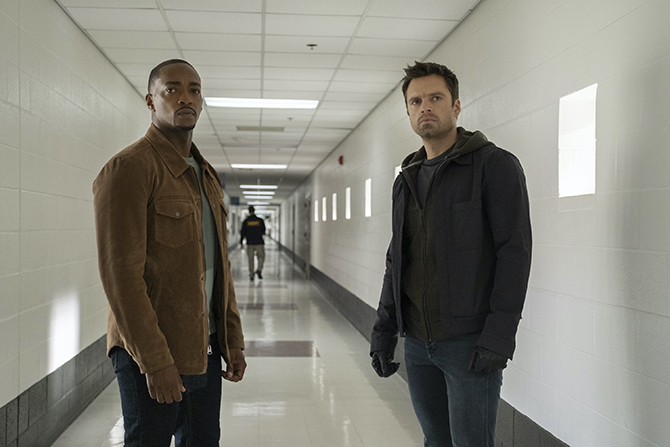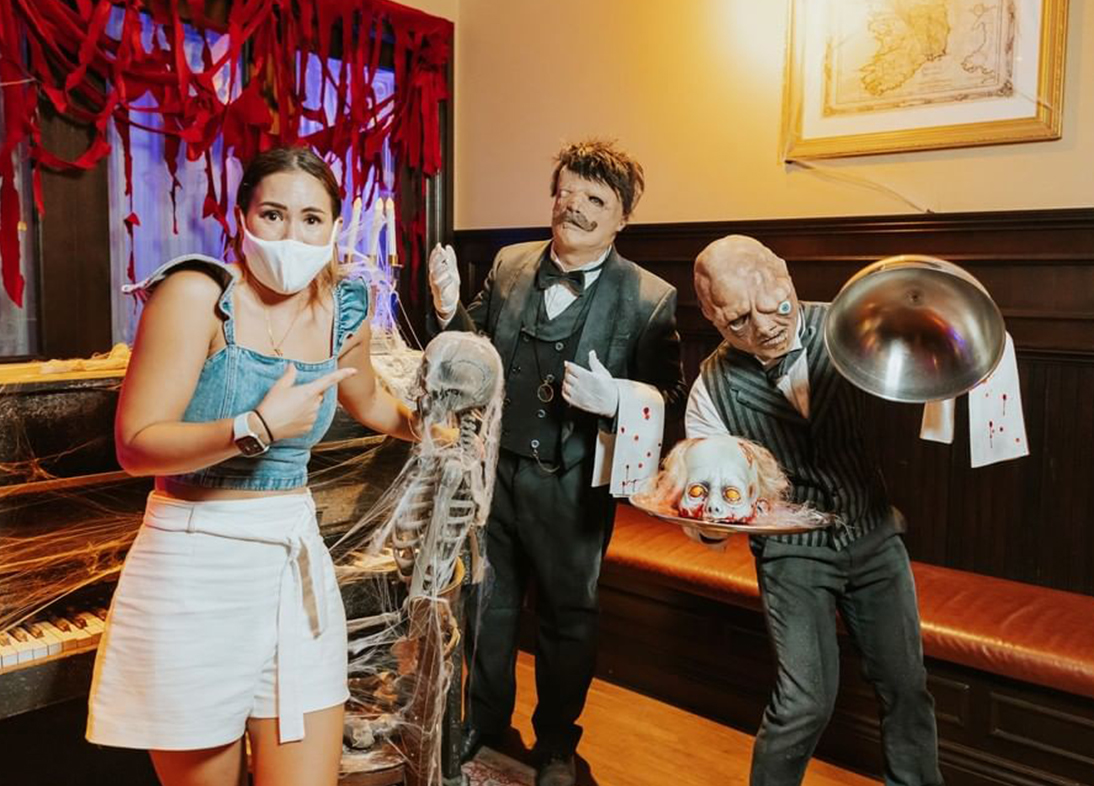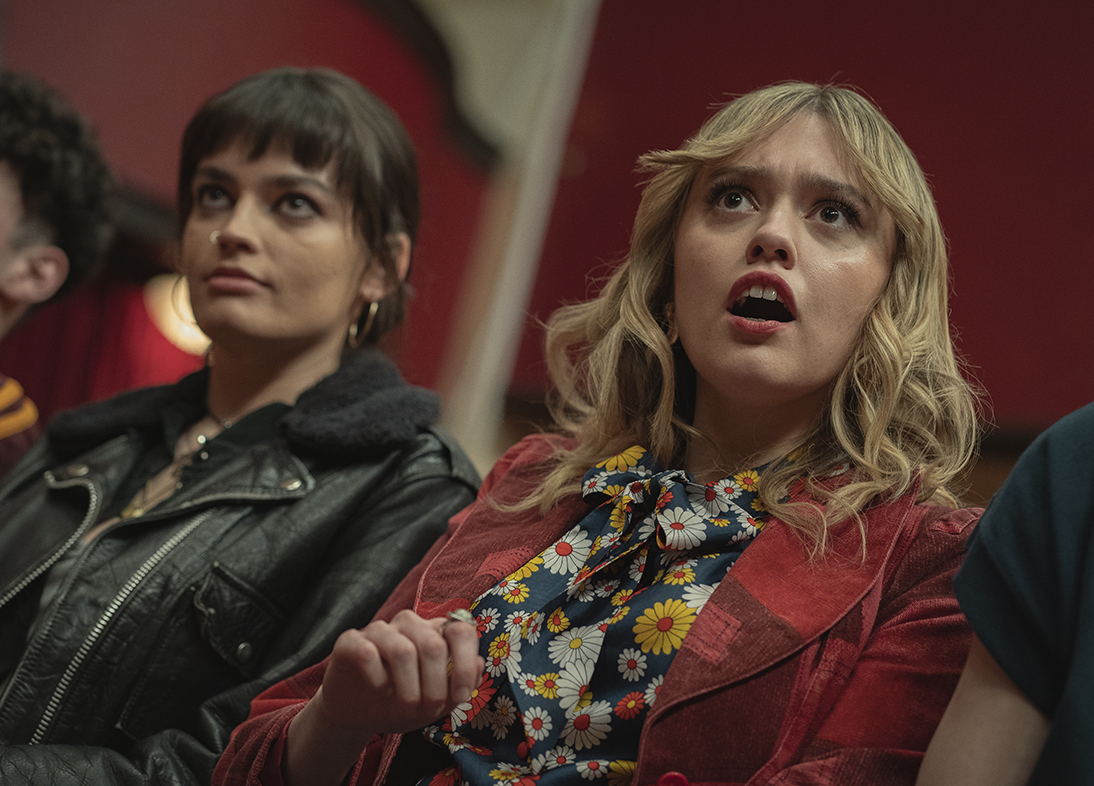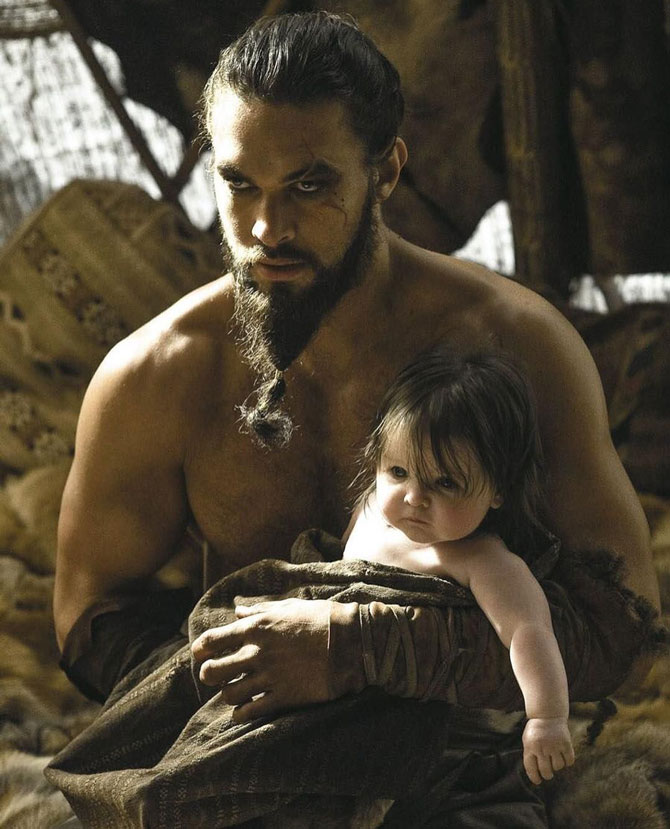The Falcon and The Winter Soldier episode 1 review, plus interview with Sebastian Stan, Anthony Mackie, and Kevin Feige
It takes two
- 17.03.2021
- By Janice Sim
We can all attest to the wonder and wit that Marvel Studios laid out in WandaVision. It was whimsical, gripping, poetic, enigmatic, and nothing like what we’ve ever seen from the MCU franchise. Its success meant two things; one: trickling down the spin-offs in an extended narrative meant that every character from the franchise could finally own their own story, to track and to finish — something that couldn’t be interrupted by an entourage of superhero superiority. No character could ever find themselves diluted in a spin-off series. Two: it meant that its next release, The Falcon and The Winter Soldier, had to match up to the magnitude of WandaVision. The six-episode series follows The Falcon, Sam Wilson (Anthony Mackie) and The Winter Soldier, Bucky Barnes (Sebastian Stan) as they grapple with the aftermath of Avengers: Endgame. Very much like a buddy-cop shebang, the two form an alliance in a global mission. We suspect yet another evil corporation has transpired this. But beyond defending the world, there’s more to unearth in the individual lives of both Wilson and Barnes — on an intimate and personal scale — as well as how the two find their footing in a new alliance, in the absence of Steve Rogers.
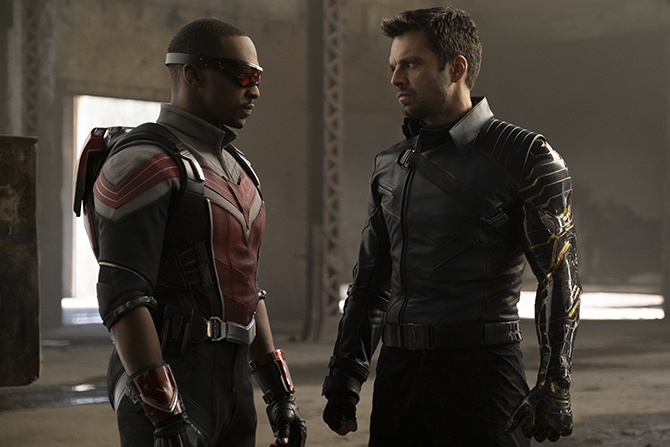
Well, the first episode does a fine job at laying the groundwork, in a very MCU-like cinematic display. All guns blazing like what we’ve been used to at a climax of a Marvel film. It polarises the subtle build-up with what WandaVision did, with an electrifying opening rescue mission featuring The Falcon thriving, while averting a handful of shoot-outs and explosions in the air. On the flipside, you’re met with Bucky Barnes brooding in therapy, as he still struggles with PTSD as well as the guilt of his past actions in his past life. There’s solace in seeing The Winter Soldier finally at rest, in touch with his humanity, and trying to live for the first time — he banters over lunch with an elderly friend and even gives dating a shot. And given his past, Barnes is a character you just can’t help but root for. No time was wasted in sounding out the parallels of the two, as with their individual personalities. Of course, some much-needed closure for Captain America, Steve Rogers (Chris Evans) in a funeral scene, where Don Cheadle made a special appearance. At the same time, the question of bearing the weight of the shield has still left Wilson feeling burdened, alongside economic struggles of helping his sister make ends meet with a glimpse into his family fishing business in Louisiana. What plays out later is an uprising of violence from an unknown group of terrorists, to which will set things up for the unlikely duo to find each other in the upcoming episodes.
To delve more into the six-parter that debuts its first episode on Disney+ Singapore, we hear from Anthony Mackie, Sebastian Stan, executive producer and president of Marvel Studios, Kevin Feige, director Kari Skogland, and head writer Malcolm Spellman.
What was the approach to the series to deliver the same MCU experience to the fans?
Kari Skogland: I approached it like a film. From the beginning, we were making a six-hour film. We just kind of, you know, figured out where to snip it, at certain hour marks. So Malcolm and I did a lot of looking into shows and primarily movies that were in our paradigm, because the characters have a buddy-cop kind of relationship going on.
Malcolm Spellman: You can go from as gritty as 48 Hrs. to as comedic as Rush Hour, but in between there is sort of that first Lethal Weapon and that first Bad Boys. And what we liked about it was it allowed Sebastian and Anthony to do what they do and create that magic, but also allows the broader creative to take on real issues or if you need to get into something very Marvel-y, it’s a very, very durable form of storytelling.
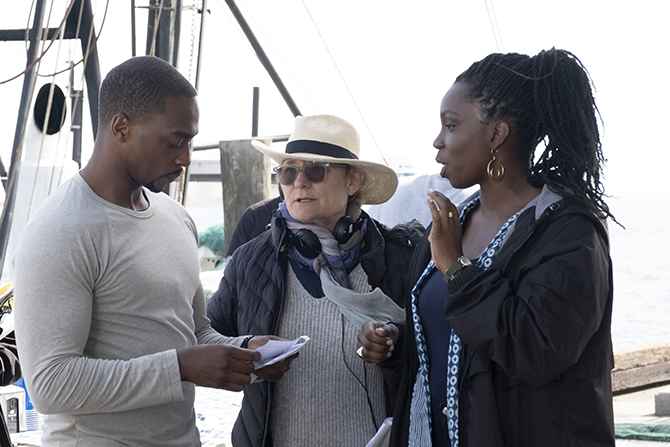
On Sam’s conflict within himself to take on the Captain America shield, why do you think he doesn’t quite know if he’s earned it just yet?
Anthony Mackie: Sam is one of those people who enjoys his friend and doesn’t just like everybody else, want to see Steve Rogers go away. You don’t wanna see Captain America go away. Because just like Captain America was your captain, Captain America was Sam Wilson’s captain. So, you know, that’s why he says at the end of Endgame, it feels like when he’s holding his shield, it feels like it’s someone else’s.
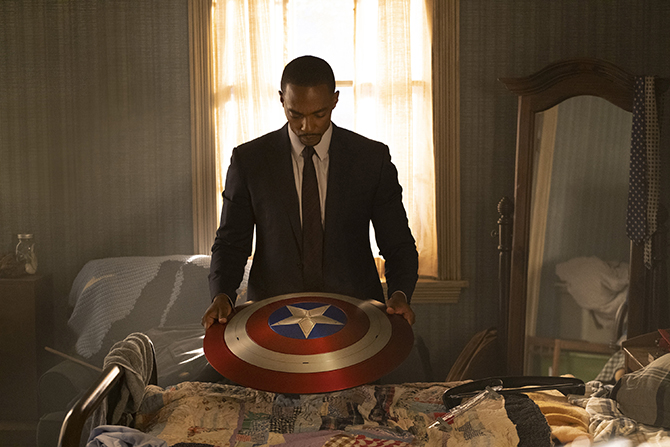
How was it like exploring a new side with the character of Bucky? What surprised you in learning more about him in this series?
Sebastian Stan: We’re really finally zooming in on his quest for identity and in terms of really accepting his past and sort of re-educating himself, really about the world that he’s currently in. The ideals and principles he might’ve lived by and been driven by at one point that perhaps no longer really serve him the same way. So it’s an interesting trajectory when we start out the show and, obviously, that’s always exciting for an actor.
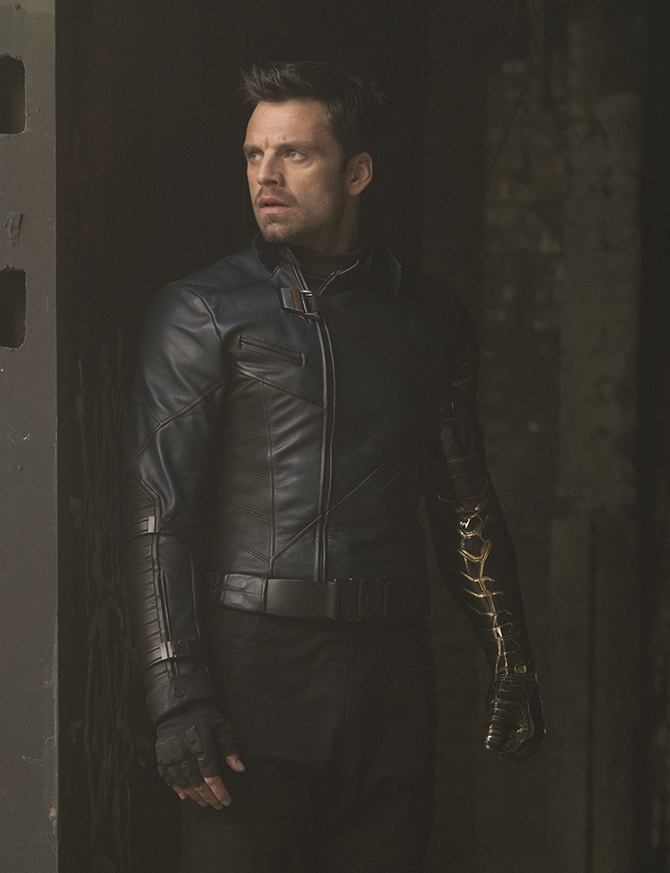
Tell us a little bit about how you guys make that dynamic work as well as you do in this series?
Anthony Mackie: The great thing about it or what I enjoy so much, is that you can’t find two people further opposite than each other than Sebastian and I. But there’s a mutual respect, understanding, and appreciation of that person. We listen, learn, and teach each other a great deal. We’re, I would say, friends? Which isn’t a term that either of us use lightly. So, I think because of that, we allow ourselves to be our best selves and we correct ourselves when we’re not our best selves.
Sebastian Stan: I always believed you are always better because of the people you surround yourself with. And particularly, I feel like in acting, we were trying to find a very fine line between sort of making sure these characters are grounded, real, and deal with very serious issues. Then, there’s sort of another piece to this, you know, about having fun and connecting.
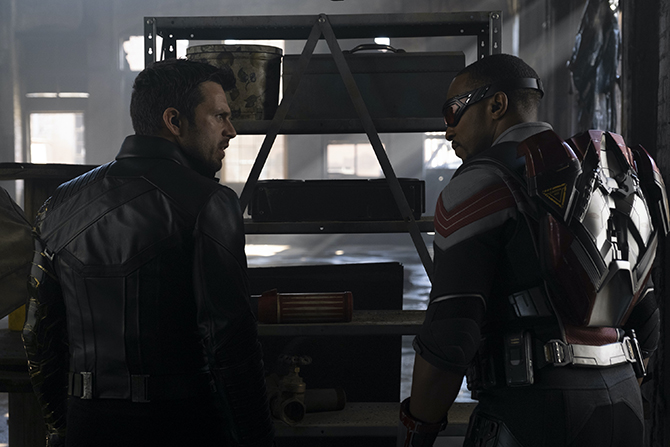
Since this is a buddy cop kind of vibe to it, is there a possibility that there could be more seasons to it?
Kevin Feige: It’s a funny question, and it’s one that we obviously get asked much more in television, because people expect it to be what people know before. So, where’s season two? Where’s season one? Well, we really did approach it like we do the movies. Which is, we better make this great, or we won’t be able to do another one.
Captain America is now gone. That’s a huge impact on the MCU, so what does that hold now that The Falcon and The Winter Soldier are some of the oldest surviving avengers. What responsibility do you feel as leading future heroes?
Anthony Mackie: Our goal, and I speak for Sebastian was to not to mess it up. So we didn’t wanna be the first crappy Marvel project. Our job was to take the torch and not make a bad show. And I’m very happy to say that Steve Rogers will be proud that our show does not suck.
Sebastian Stan: Answering your question is very much their journey throughout the show. They would go: “What do I have to contribute? What is going to be my legacy?” So there’s all these pieces to it that are kind of interesting rather than just coming out of the gate and saying, “I got all the answers”.
ADVERTISEMENT. CONTINUE READING BELOW
